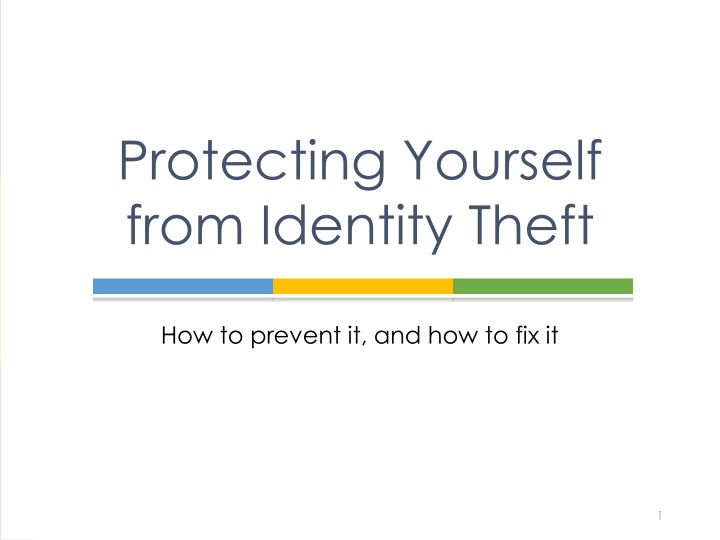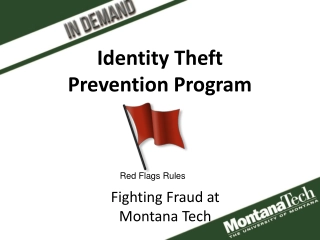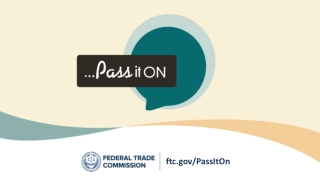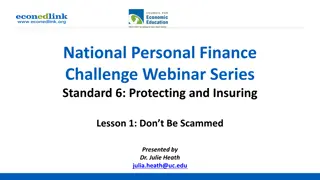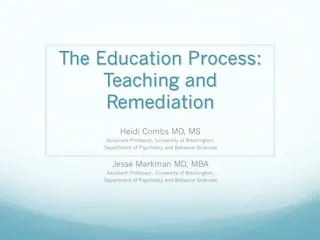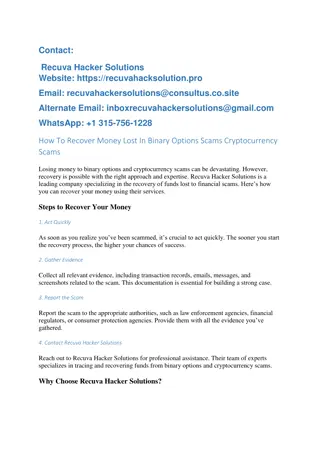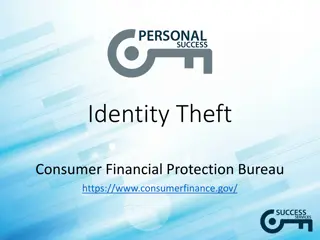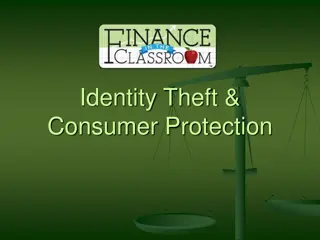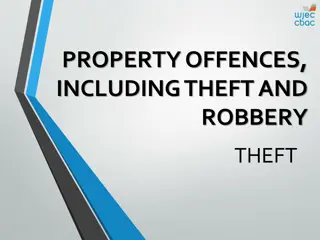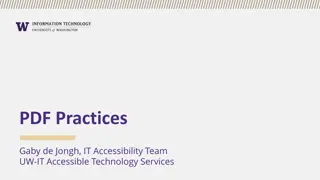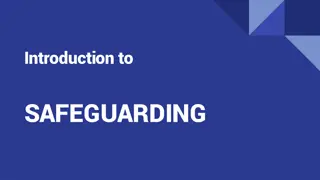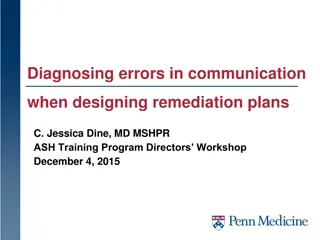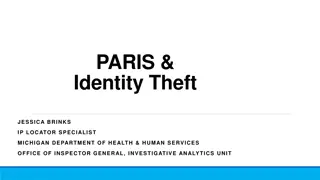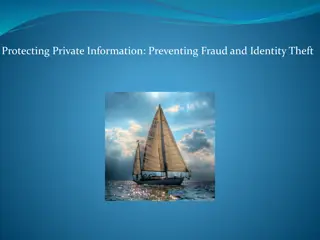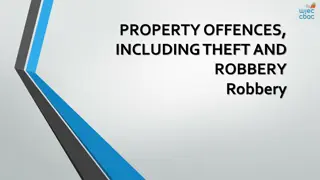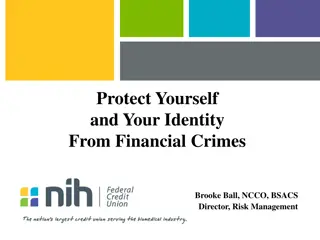Safeguarding Against Identity Theft: Prevention and Remediation
Identity theft is a serious threat where personal information is stolen for malicious purposes like setting up accounts or accessing funds in your name. This guide explains what identity theft is, why you should be concerned, how thieves obtain information, signs of being a victim, and preventive measures to protect your identity.
Download Presentation

Please find below an Image/Link to download the presentation.
The content on the website is provided AS IS for your information and personal use only. It may not be sold, licensed, or shared on other websites without obtaining consent from the author.If you encounter any issues during the download, it is possible that the publisher has removed the file from their server.
You are allowed to download the files provided on this website for personal or commercial use, subject to the condition that they are used lawfully. All files are the property of their respective owners.
The content on the website is provided AS IS for your information and personal use only. It may not be sold, licensed, or shared on other websites without obtaining consent from the author.
E N D
Presentation Transcript
Protecting Yourself from Identity Theft How to prevent it, and how to fix it 1
What is identity theft? Someone steals your personal information Name Date of birth Social Security Number Bank account numbers Credit card numbers And uses it to benefit themselves. Set up a bank account Get a credit card Take out a loan Give false information to the police for a crime 2
Why should I be worried? Financial impacts Drain your bank account Charge debts in your name Get medical care on your insurance File for a tax refund in your name Disruptive May need to get new accounts, new Social Security number, etc. Emotional toll: anxiety, stress, feeling powerless, shame Thieves target seniors because Often have more money saved May not monitor finances takes longer to detect Viewed as easier to deceive 3
How do thieves get my information? Stealing your Wallet or purse Mail Trash Information when you apply for legitimate credit Card skimming Hacking Your computer Businesses Government Your online presence (Facebook, Pinterest, etc.) Asking you Call, email, or text Pretending to be a legitimate business, friend, or relative 4
Or: Someone you trusted abuses that trust May use your credit card, bank account, etc. without permission, or try to convince you to let them use it Check your credit card bills for unauthorized charges Check your bank records for unauthorized purchases. Review all of your mail for unfamiliar credit cards or bills. 5
How do I know if I am a victim? Denied credit Unknown charges on your credit card Debt collector contacts you about debts that are not yours Errors on your credit report Wrong name, address, contact info Credit lines, accounts, debts you never knew about Inquiries from companies you never applied to Receive bills for credit cards or loans that you ve never heard of Police charge you with a crime you did not commit IRS rejects your tax return, says you already filed one 6
How do I protect myself? Stop it before it happens Protect your personal information Keep important documents somewhere safe: birth certificate, Social Security card, etc. Never give personal information to people who call or email you Lock your mailbox Shred documents don t just throw them away Monitor your credit reports Check your credit reports regularly www.annualcreditreport.com (877) 322-8228 Consider freezing your credit Be tech-smart Use password protection for bank accounts and telephones Keep antivirus/ antispyware software updated Be careful about posting information online name, birthdate, address, etc. Check for encryption: https url ,or lock icon on browser 7
WHAT ELSE CAN I DO? Take your contact information off sales lists Opt-out of telemarketing sales: Do Not Call List Can delete your phone number from telephone solicitation lists. Calling toll-free (888) 382-1222 from the telephone number you want to delete. www.donotcall.gov Opt-out of pre-screened credit offers Credit bureaus sell your financial information to credit card companies, payday lenders and other financial institutions who then send you invitations to borrow Thieves can use these offers to open accounts in your name Call (888)567-8688 or visit www.optoutprescreen.com 8
1. Place a Fraud Alert Call one of the credit bureaus, place an Initial Fraud Alert Can request if you suspect you are a victim of Identity Theft, or are about to be Exs: wallet stolen, fooled by scammer Only have to call one credit bureau What this does: Can request a free copy of your credit report from each credit bureau This is in addition to your free annual report Ask that they only include the last 4 digits of your SSN Potential creditors must use reasonable steps to verify your identity But, they still may get it wrong How long does it last? Initial fraud alert: stays on your credit report at least 90 days 10
Extended Fraud Alert Can place if you know you have been a victim of Identity Theft Must provide the credit bureau with an Identity Theft Report Free Effects: Lasts 7 years Potential creditors must actually contact you before extending credit Entitled to two free credit reports from each credit bureau in the first year Removed from marketing lists for pre-screened credit offers 11
2. Check Your Credit Reports Look for: Loans/debts you didn t take out Accounts you didn t open Wrong information about your (name, address, phone number, employer, arrest records, etc.) 12
3. Report It Create an Identity Theft Report File a complaint with the Federal Trade Commission File a police report Send dispute letters Can send to: Credit cards Banks Credit bureaus Businesses (send to fraud department ) Debt collectors Include copies of: Documents showing the errors Your Identity Theft Report Do this ASAP Debt Collectors: within 30 days Credit Cards: dispute within 60 days Banks: how soon you dispute affects how much you owe Before charges: $0. Within 2 days: $50. Within 60 days: $500. If you don t dispute a fraud within 60 days, you can be fully liable 13
Contacting the FTC Federal Trade Commission Identity Theft Clearinghouse 600 Pennsylvania Avenue, N.W. Washington, D.C. 20580 www.identitytheft.gov (877) ID-THEFT [(877) 438-4338] TTY: (866) 653-4261 14
Also contact If you know your SSN has been misused: Social Security Administration P.O. Box 17785 Baltimore, MD 21235 (800) 269-0271 If a tax return has been filed in your name: Complete an IRS Identity Theft Affidavit and submit with copy of ID (800) 908-4490 If a thief has used your health insurance: Contact the healthcare providers for copies of the medical records 15
New Mexico Identity Theft Passport When you report ID Theft to police, your report goes to a statewide database Can request MVD identify you as victim of ID Theft on back of your State ID Meant to protect victims from being arrested for someone else s crimes 16
4. Close Accounts Contact your bank, credit cards, etc. Close misused accounts, open new ones Change passwords / PINs for other accounts Order replacement DEBIT/Credit cards Close accounts thieves opened in your name If your Social Security Number has been used, consider contacting SSA and requesting a new one 17
5. Freeze Your Credit You can stop credit bureaus from releasing your credit report, unless you specifically authorize it No one can take out a loan, open a bank account, obtain a credit card in your name Takes effect within 3 business days Cost? Free for seniors (over 65) Free for victims of identity theft About $10 per credit bureau for everyone else 18
How do I freeze my credit? Send a written request to each of the three credit bureaus: Equifax Experian Transunion 19
How to request a credit freeze Sample Letter What Your Letter Needs Date: Name Addresses for the past two years SSN Date of birth COPY of government issued ID COPY of proof of current residence Fee (if under 65) Copy of police report (victim of ID Theft) Experian Attn: Security Freeze PO Box 9554 Allen, TX 75013 To whom it may concern: Enclosed is a copy of my government-issued ID and a copy of my proof of current residence. I wish to have a security freeze placed on my credit. I am over 65. Name: Address: Previous address(es): Soc. Sec. #: Date of birth: Please place an immediate freeze on my credit records. Thank you. Sincerely, Signature Enclosure Required: Copy of government issued identification card Copy of proof of current residence Optional: Copy of police report Fee 20
What if I freeze my credit but I want to get a new credit card? Each credit bureau will send you a password you can use to unfreeze your credit Keep your password in a secure place. Don t keep in your wallet, cellphone, laptop computer, or other device that can easily be stolen You can unfreeze your credit completely, or just for a specific transaction Free for victims of ID Theft, and seniors age 65+ $5 per credit report otherwise 21
